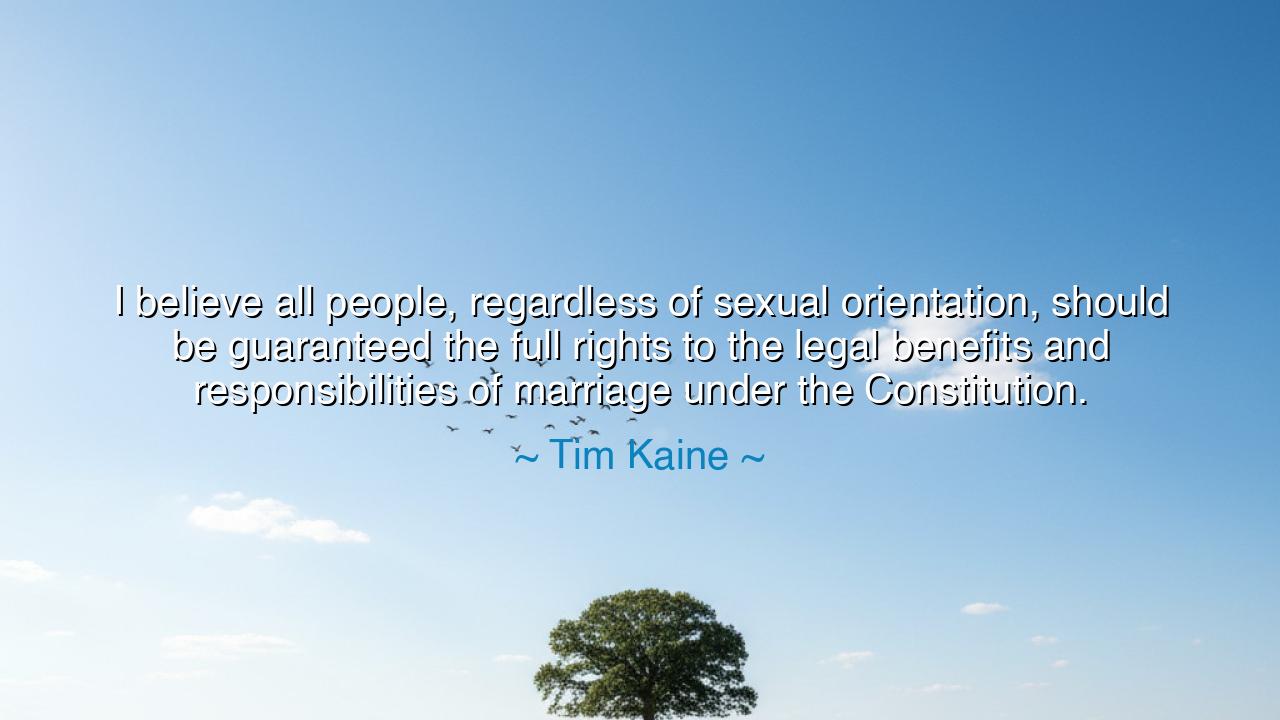
I believe all people, regardless of sexual orientation, should be
I believe all people, regardless of sexual orientation, should be guaranteed the full rights to the legal benefits and responsibilities of marriage under the Constitution.






The words of Tim Kaine, “I believe all people, regardless of sexual orientation, should be guaranteed the full rights to the legal benefits and responsibilities of marriage under the Constitution,” rise like a declaration not only of politics, but of human dignity. They speak to the eternal truth that the law, if it is to be just, must embrace all who dwell under its protection. In Kaine’s voice, there is not the cold precision of legal argument, but the warmth of moral conviction — a belief that love, in its many forms, is sacred not because it conforms to tradition, but because it springs from the essence of what it means to be human. His words are both an affirmation and a challenge: that a nation cannot call itself free while denying to some what it grants to others, nor can it claim to honor its Constitution while withholding from any citizen the full measure of equality that the law promises.
The origin of this quote lies in the long and painful journey toward marriage equality in the United States. For decades, same-sex couples lived as second-class citizens — their unions unrecognized, their rights denied, their love relegated to the shadows of legality. Kaine, a man of deep faith and public service, stood among those who came to believe that equality under the law was not an act of indulgence, but an act of justice. His statement reflects the transformation of a society wrestling with its own conscience — a movement from fear to understanding, from prejudice to compassion. When he spoke these words, he was not merely echoing the political winds of his time; he was affirming a principle that has echoed through the ages: that justice delayed is justice denied, and that the measure of a nation’s greatness lies in how it treats the least among its people.
To grasp the full weight of his statement, one must remember the turning point that came in 2015, when the Supreme Court, in Obergefell v. Hodges, declared that the right to marry is fundamental under the Constitution, and that it cannot be denied to same-sex couples. This decision did not create new rights — it recognized old ones long ignored. It restored to countless people the dignity that had been withheld by fear and tradition. And in that moment, Kaine’s words found their fulfillment: the legal benefits and responsibilities of marriage — inheritance, healthcare, parental rights, and shared duty — were extended not to a class, but to a community, not to a preference, but to a people. It was a victory not only of law, but of love’s endurance against centuries of misunderstanding.
In his words, Kaine also calls attention to the dual nature of marriage — as both benefit and responsibility. He reminds us that equality is not a gift, but a balance: those who seek the protection of the law must also accept its duties. Marriage, in his view, is not only the celebration of affection, but the covenant of mutual care — a union of rights and obligations that forms the bedrock of society. To deny any person access to that covenant, he implies, is to deny them full citizenship in the moral and civil order. The Constitution, in its wisdom, does not guard privileges; it guards principles. Among these, none is more sacred than the belief that liberty and equality belong to all, not as favors bestowed by government, but as birthrights of humanity.
History offers countless echoes of this truth. In the 19th century, when the abolitionist Frederick Douglass fought for the freedom and recognition of his people, he did not ask for special treatment — he asked only that the rights enshrined in the nation’s founding documents be applied to all without exception. “The Constitution,” he said, “knows no distinction of color.” In the same spirit, Kaine’s declaration insists that the Constitution knows no distinction of orientation. The law must see every person as equal in dignity, and every love as equal in worth. When nations forget this, they begin to decay from within; when they remember it, they rise into moral maturity.
The deeper wisdom of Kaine’s words lies in the understanding that law is the servant of conscience, not its master. The ancients taught that the laws of men must align with the laws of nature and reason, or they will crumble. When the law excludes love, it breeds hypocrisy; when it honors love, it sanctifies justice. By affirming the legal rights of same-sex couples, Kaine speaks to this harmony between justice and compassion. For what is civilization if not the slow expansion of empathy — the widening of the circle until no one stands outside it? In that sense, the legalization of same-sex marriage is not merely a policy shift, but a moral awakening — the recognition that freedom must evolve as humanity does.
Let the lesson of Tim Kaine’s words be passed down to all generations: that equality is not a concession, but a commandment of justice; that the Constitution, when interpreted through the light of compassion, becomes not a shield of privilege, but a mirror of our shared humanity. The task of each generation is to ensure that the promises of liberty reach further than before, that no one’s love or life remains unseen by the law. And to those who still fear such change, Kaine’s words offer reassurance — that when justice expands, it does not diminish the old, but perfects it. For as the ancients knew, a society that honors love in all its forms does not weaken; it becomes wiser, freer, and more human.






AAdministratorAdministrator
Welcome, honored guests. Please leave a comment, we will respond soon